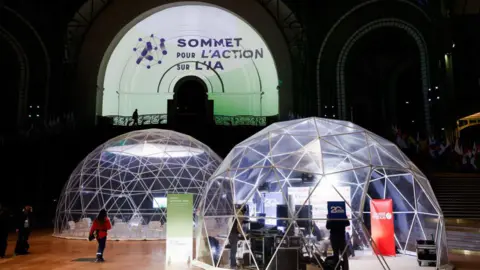
The UK and US did not sign an international agreement on artificial intelligence (AI) at a global summit in Paris.
The statement, signed by countries like France, China, and India, promises an "open," "inclusive," and "ethical" approach to developing the technology.
Downing Street stated that the UK "couldn't agree on all parts of the leaders' declaration" and would "only sign up for initiatives that align with UK national interests."
Earlier, US Vice President JD Vance told delegates in Paris that too much regulation of AI could "kill a transformative industry just as it's taking off."
Vance informed world leaders that AI is "an opportunity the Trump administration will not waste" and emphasized that "pro-growth AI policies" should be prioritized over safety.
He mentioned that this would require regulation that encourages AI development "rather than restricts it."
Vance added that leaders in Europe should "approach this new frontier with optimism, rather than fear."
His comments seem to conflict with French President Emmanuel Macron, who supported the need for more regulation.
"We need these rules for AI to progress," Macron said at the summit.
The UK has been a strong supporter of AI safety, with then Prime Minister Rishi Sunak hosting the world's first AI Safety Summit in November 2023.
Andrew Dudfield, head of AI at the fact-checking organization Full Fact, said the government's choice not to sign the Paris communique puts that at risk.
"By refusing to sign today's international AI Action Statement, the UK Government risks damaging its hard-earned reputation as a global leader in safe, ethical, and trustworthy AI innovation," he said.
What does the agreement say? The statement, signed by 60 countries, aims to reduce digital divides by promoting AI accessibility and ensuring the technology's development is "transparent," "safe," and "secure and trustworthy."
"Making AI sustainable for people and the planet" is listed as another priority.
The agreement also mentions that AI energy use, which experts warn could grow to match that of small countries in the future, was discussed at the summit for the first time.
"Looking at the summit declaration, it's hard to see exactly what the government disagrees with," said Michael Birtwistle, associate director at the Ada Lovelace Institute.
Addressing the UK's decision not to sign it, the Prime Minister's official spokesperson told reporters that "these discussions are ongoing" and noted that the UK has "worked closely with the French throughout this process."
"They remain one of our closest partners in all areas of AI," they said.
Balancing Acts
This comes amid discussions at the summit about the impact of AI development on society, the environment, and governance.
Policy-makers, executives, and diplomats have been considering how to capture the economic benefits of AI innovation while addressing the technology's risks.
The summit began with Macron posting a compilation of humorous deepfake clips of himself in popular films and TV series on social media.
"This summit is focused on action, and that is exactly what we need right now," said European Commission President Ursula von der Leyen on Tuesday.
She stated that Europe's approach to AI, highlighted throughout the summit, would also emphasize innovation, collaboration, and "embrace the power of open source" technology.
The meeting is also happening amid growing trade tensions between the US and Europe.
President Trump has decided to impose tariffs on steel and aluminum imports into the US, a move that will affect the UK and EU.
It is understood that the UK will not immediately retaliate, as it seeks to maintain good relations with the Trump administration while also building closer ties with the EU.
